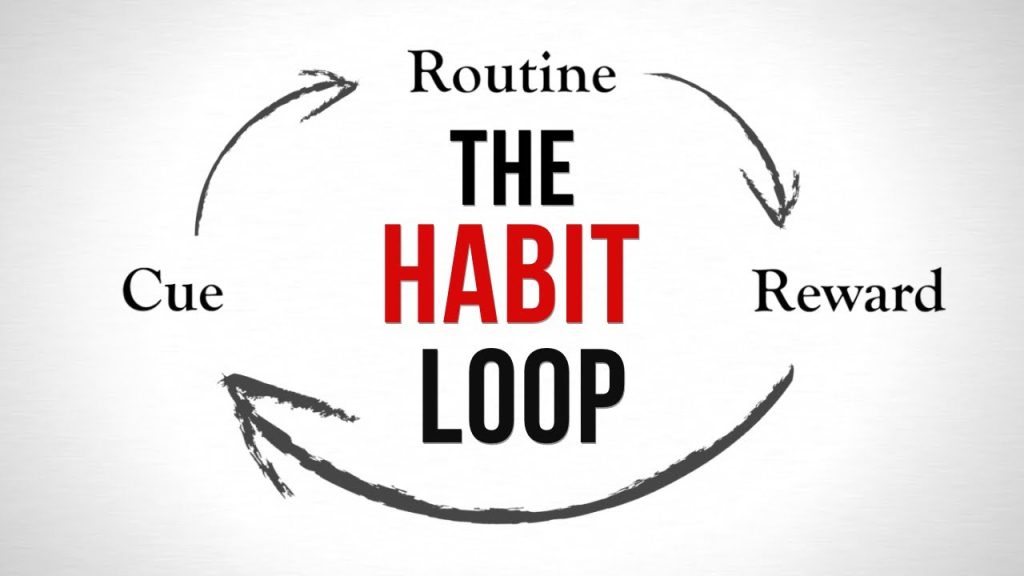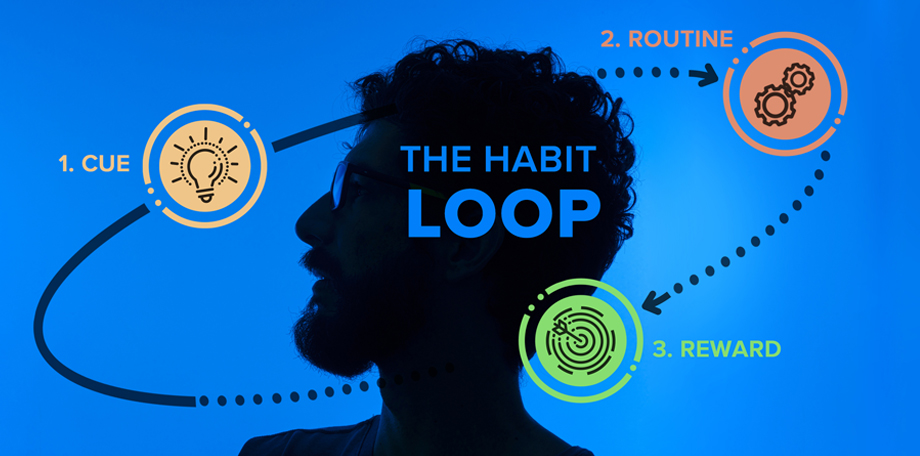The Habit Loop: Understanding the Power of Habits
Habits play a crucial role in shaping our lives. From brushing our teeth in the morning to checking our phones for notifications, habits define much of our daily behavior. They can work for us—building positive routines and making life more efficient—or against us—reinforcing negative patterns that are hard to break. The concept of the habit loop provides a powerful framework to understand how habits work, how they form, and, most importantly, how we can change them.

What is the Habit Loop?
The habit loop is a neurological pattern identified in the brain that governs any habit. According to Charles Duhigg, author of The Power of Habit, every habit is composed of three components:
Cue (or Trigger): The signal or event that initiates the habit.
Routine: The actual behavior or action performed.
Reward: The benefit or pleasure you gain from performing the behavior.
These three elements form a loop that becomes stronger over time, reinforcing the behavior until it becomes automatic.
Let’s break down each part.
1. Cue: The Starting Point of the Loop
The cue is what triggers the brain to go into automatic mode and initiate a habit. It can be:
A location (e.g., walking into the kitchen),
A time of day (e.g., 3 PM, mid-afternoon),
A mental state (e.g., feeling bored or stressed),
A person (e.g., being around a friend who smokes),
Or an immediately preceding action (e.g., finishing dinner leads to craving dessert).
For example, suppose every afternoon at 3 PM, you start craving a sugary snack. The cue in this case is the time of day. It signals your brain that it’s time for a treat, setting off the next step in the loop.
Understanding your cues is the first step to changing a habit. When you become conscious of what triggers your behavior, you begin to have more control over it.
2. Routine: The Behavior Itself
The routine is the action that follows the cue. It can be physical (eating a cookie), mental (feeling self-critical), or emotional (feeling relief or pleasure). This is the most visible part of the habit loop—what we do when the cue strikes.
Routines can range from simple actions like brushing teeth to more complex behaviors like checking social media every time you’re bored. Because routines become automatic over time, they often occur without much thought or awareness.
Habits become deeply ingrained through repetition. The more often a routine follows a cue, the more automatic it becomes. Over time, the brain stops participating fully in decision-making and just follows the script. This is efficient but can also be problematic when the routine is harmful.
3. Reward: The Brain’s Payoff
The final part of the habit loop is the reward. This is the payoff your brain receives for completing the routine. Rewards can be:
Emotional: A sense of satisfaction, relaxation, or pleasure.
Physical: A sugar high, caffeine rush, or nicotine buzz.
Mental: A sense of accomplishment or relief from boredom or anxiety.
Rewards are crucial because they reinforce the habit loop. When the brain enjoys the reward, it remembers the loop and wants to repeat it. Over time, the brain starts anticipating the reward as soon as it sees the cue—even before the routine starts.
This anticipation creates a craving, which strengthens the habit. Craving is what transforms a one-time action into a habit. The stronger the craving, the harder the habit is to break.

Putting the Habit Loop into Action
Understanding the habit loop allows us to take control of our behaviors. Let’s look at how to use this framework to build good habits and break bad ones.
Changing a Habit: Keep the Cue and Reward, Change the Routine
According to Duhigg, the golden rule of habit change is:
“You can’t extinguish a bad habit, you can only change it.”
This means that the cue and reward often remain the same, but you can change the routine in between. Here’s a real-life example:
Cue: Feeling stressed at work.
Old Routine: Smoking a cigarette.
Reward: A moment of relaxation and calm.
To change this habit, identify the cue (stress) and reward (calm), and then find a new, healthier routine that provides a similar benefit. For instance:
New Routine: Take a five-minute walk or practice deep breathing.
New Reward: Still feel relaxed and refreshed.
By repeating the new routine over time whenever the cue appears, the brain can be trained to adopt the new behavior.

The Role of Cravings in the Habit Loop
Cravings are the glue that hold the habit loop together. They are the brain’s desire for the reward, and they drive us to perform the routine when the cue appears.
When you see a cue, your brain starts to crave the reward. For example, smelling popcorn in a movie theater might trigger a craving for that buttery flavor—even if you just ate. The craving motivates you to stand in line and buy popcorn. Once you eat it, your brain is satisfied, and the loop is reinforced.
The more intense the craving, the stronger the habit. That’s why marketers work hard to associate products with certain cues and emotional rewards—think of jingles, smells, or slogans.
To change a habit effectively, you need to understand and manage the craving at its root. Ask yourself: What are you really craving? Is it the taste, the feeling, the distraction, or something else?
How Habits Are Formed: The Neurological Pathway
When a habit is formed, it creates a neurological pathway in the brain. The more that pathway is used, the stronger it becomes. This is called chunking—the brain condenses a sequence of actions into a single routine.
Imagine learning to drive a car. At first, everything is difficult—checking mirrors, shifting gears, watching traffic. But over time, the brain chunks these actions into a habit loop. Eventually, you drive without thinking about every individual movement.
The basal ganglia, a part of the brain involved in emotions, memory, and pattern recognition, plays a key role in habit formation. Once a habit is established, it requires minimal mental effort.
This is why habits are so powerful—and why breaking them requires conscious effort and persistence.

Using the Habit Loop to Build Good Habits
While the habit loop can entrench bad behavior, it can also be used to build powerful, positive routines. Here’s how:
1. Identify a Cue
Tie your new habit to something consistent. For example, doing ten pushups after brushing your teeth or writing in a journal before going to bed.
2. Choose a Simple, Doable Routine
Start small. The routine should be easy enough that it doesn’t feel overwhelming. Consistency is more important than intensity.
3. Attach a Reward
Even something simple like checking off a to-do list or saying “Good job!” to yourself can create a reward loop. Over time, the routine becomes satisfying in itself.
4. Repeat
Repetition strengthens the neural pathway. Aim for consistency over perfection. Even missing a day isn’t a failure—as long as you keep going.
Why Willpower Alone Isn’t Enough
Many people believe they can break habits through sheer willpower. While willpower is important, it’s not reliable over long periods—especially under stress or fatigue.
Understanding the habit loop provides a more strategic approach. Rather than fighting the habit head-on, you work with the brain’s natural processes to redirect behavior.

Real-Life Examples of Habit Loops
Example 1: Morning Coffee
Cue: Waking up
Routine: Making and drinking coffee
Reward: Feeling awake and energized
This habit is so automatic that many people can’t imagine starting their day without it.
Example 2: Social Media Scrolling
Cue: Feeling bored
Routine: Opening Instagram or TikTok
Reward: Distraction, entertainment, or a dopamine hit
Understanding this loop helps explain why it’s so hard to stop doom-scrolling.
Conclusion: Mastering the Habit Loop
The habit loop is a powerful tool for understanding and reshaping behavior. By dissecting habits into cue, routine, and reward, we gain clarity over our actions and how they are formed. This awareness gives us the power to intentionally design better habits, replace negative ones, and ultimately transform our lives.
Remember, small changes repeated consistently lead to big results. The key to mastering your habits is not through willpower alone, but through understanding and rewiring the loop that drives your daily behavior.
https://nimblefoundation.org/
https://amzn.in/d/62bBrGb
https://a.co/d/aIwRhTP
https://www.linkedin.com/in/satish-kakri-executive-coach-17224417
https://www.facebook.com/nimblefoundation1
https://nimblefoundation.org/feedback.html
Thanks For Reading.







